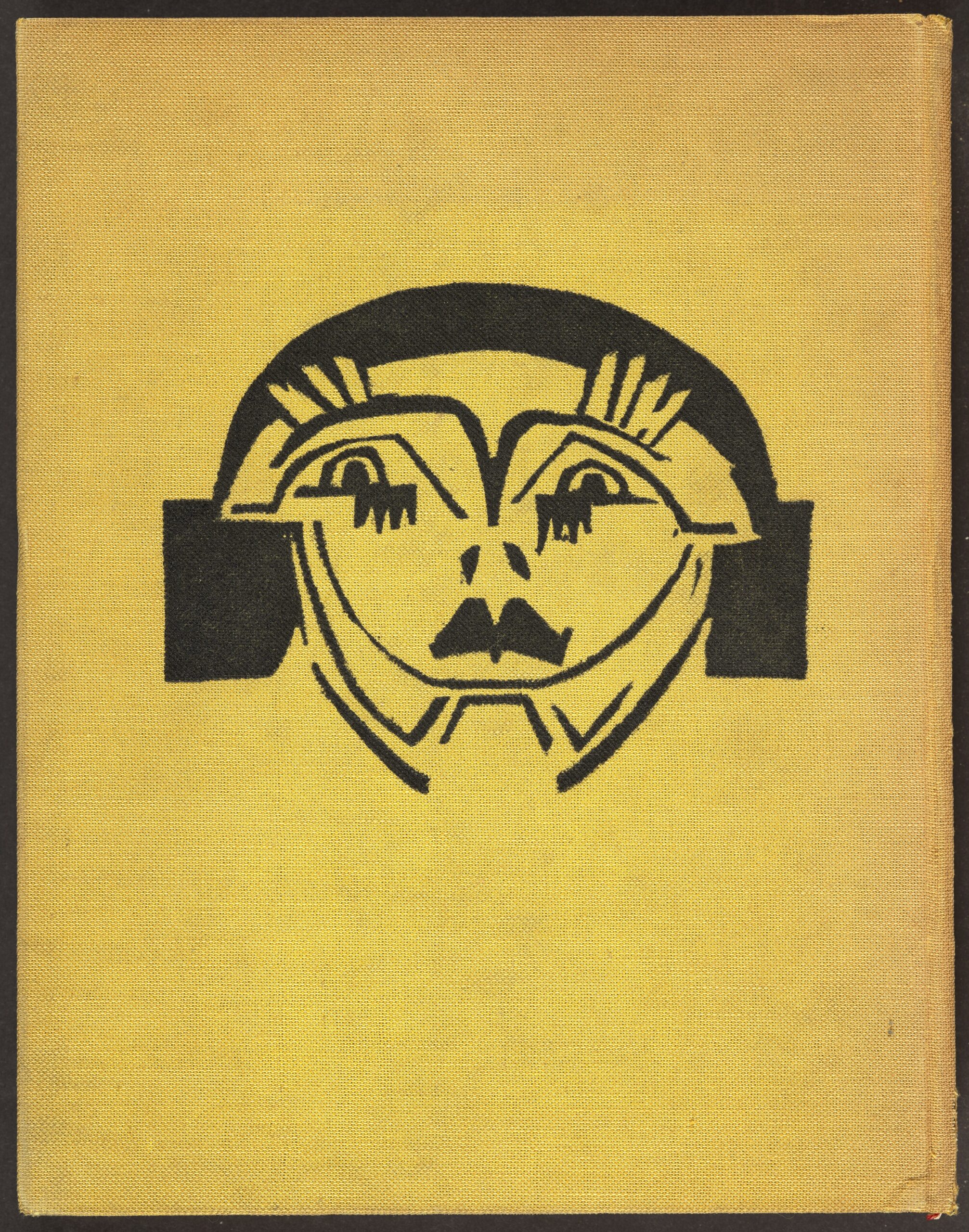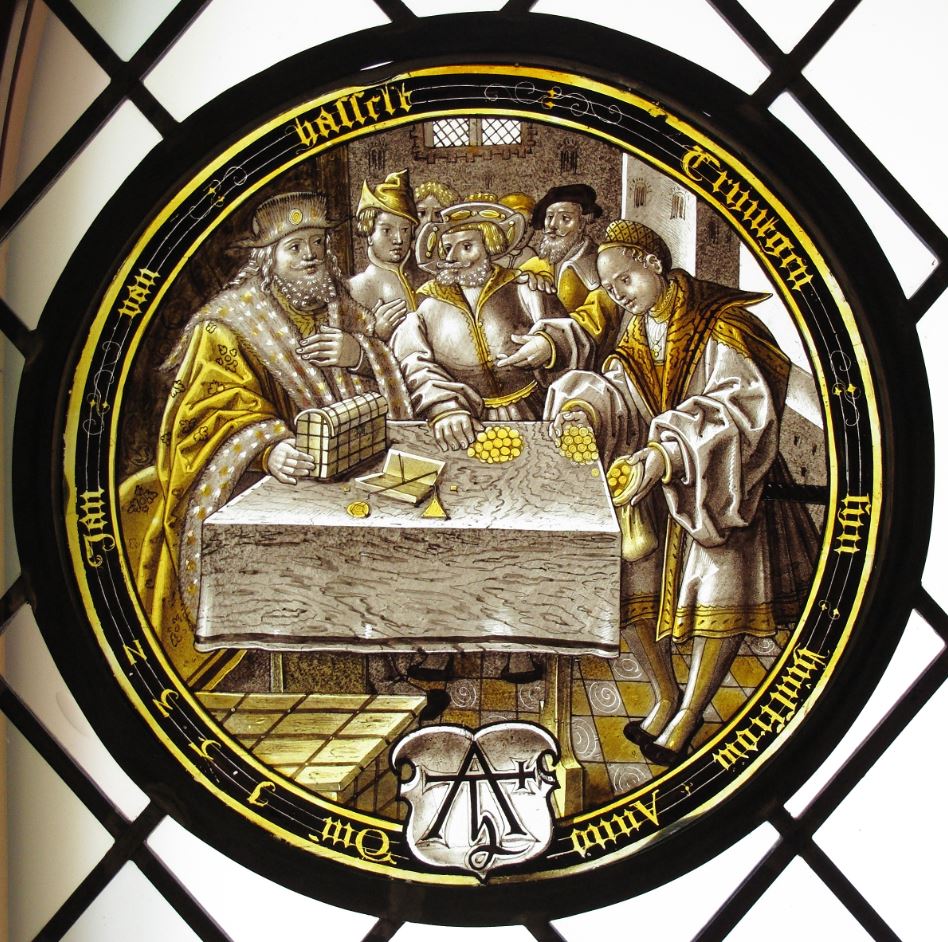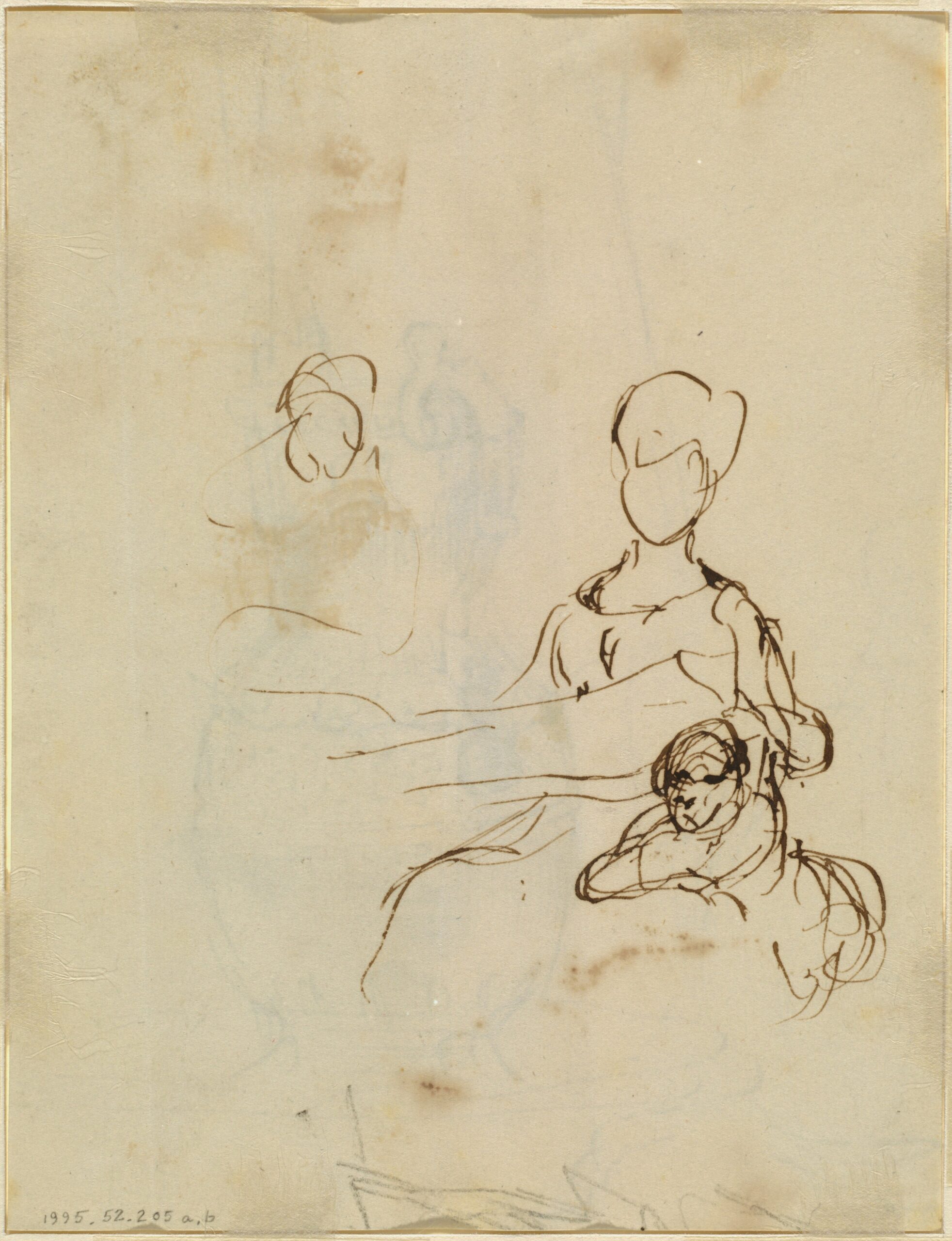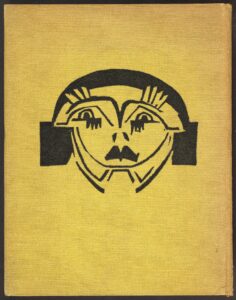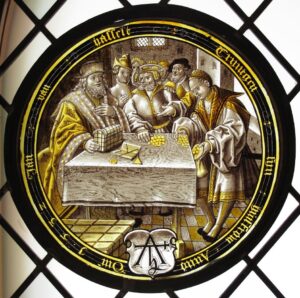Hardware
by Thomas Legendre
A cheap rent came up thanks to USB who needed two flatmates of so-called “good character” to satisfy the proprietor who also happened to be her aunt. Was Bitcoin interested? Bitcoin was more than interested until he heard the address. It wasn’t the neighborhood of pram-pushers and pensioners that put him off but the prospect of cycling those extra miles for lectures, not to mention all the other paper-cuts of distance. He waved it off.
No Shit Sherlock reacted like he had just refused a free pint. “You want to live in one of those overpriced fish tanks like everyone else? Let’s shed the stigmata.”
”You mean stigma,” Bitcoin said.
”I mean stigmata!” No Shit Sherlock held up hands which had neither nail holes nor evidence of a single day’s labor, not that it mattered because the holes would have been in the wrists. “Come on, it’ll be funny to live in Stockbridge, yeah?”
By funny he meant cheap. Exactly how “funny” did he mean? Very funny indeed, it turned out. So funny, in fact, that Bitcoin took it sight unseen. He had enough sense to grab a good thing before he even saw what it was.
This is Bitcoin’s story, by the way. Names and other details have been futureproofed.
A week later they hired a man with a van, and after sweating their stuff up the stairs, stood victorious on bare flagstones. High ceilings and cornice work. Central heating, as promised. Double-sash windows. Bitcoin reckoned it was A-listed Georgian, double the size and half the price of their last digs. And not quite Stockbridge, after all. The New Town. They had won the postcode lottery. He also noted, however, a lack of furniture as well as carpeting. It felt like an illegal squat. He treaded lightly through the place, unable to shake the sense their neighbors might ring the police until he came upon No Shit Sherlock in the sitting room just as the sun breached an overcast day. It brought a warm complexion to the walls and pine flooring, a vintage to the knots and grain. The windows held six panes each in the upper and lower sashes with warpings that gave the world a watery look, not quite itself out there. The shutters were double-jointed with brass hinges and knobs. Yet the overhead light was a single bulb inside paper globe, no doubt replacing a chandelier extracted like a gold tooth by USB’s aunt before turning it over to her niece.
”Fur coat and nae knickers,” No Shit Sherlock said, taking a rare stab at a Scottish accent, which he knew Bitcoin would forgive. He stood at the window, fingering the silver stud in his ear. “This flat being the fur coat, the lack of furniture being the knickers.”
No Shit Sherlock had a habit of stating the obvious.
”I get you,” Bitcoin said. “But without furniture I see nothing here apart from squash or ballroom dancing.”
No Shit Sherlock locked arms with an invisible partner and began pacing out a tango. Despite the gesture he had a slumpy way of holding himself, a bit of pudge in the midsection, though he compensated with assured slapdash—collared shirt, knee-gashed jeans, suede shoes—all worn with saucy disregard. His hair was long on top but short in back, like a reverse mullet, the success of which was entirely dependent on gel.
“Seriously,” Bitcoin said, “even a natty sofa would do.”
”That’ll be USB.”
“She said sofa?”
“She promised sofa.” He lifted away with a ballet pivot, but then caught himself and turned back. “You were hoping for an upgrade?”
”Upgrade, what?”
”This.” He gestured. “The room.”
Bitcoin blinked at the outlandish notion. USB had already given notice on the bedroom with the en suite, so they had flipped a coin for the larger of the two remainders, which No Shit Sherlock had won. Bitcoin had taken some comfort, though, in discovering that the smaller room was also in the back. It would be quiet, at least.
But now this feeling, here it was again, that No Shit Sherlock was offering and thwarting great expectations at once.
Bitcoin ran his hand along the fireplace mantel—white marble, no less, and cool to the touch even now, in the claggy remains of summer—all the while pretending to consider the vast room for himself so he could show he was being magnanimous.
He gavelled his fist on the mantel. “Let’s unpack.”
They unpacked. It took Bitcoin twenty minutes. He was lean and mean from all his moves, wanting little and needing less. But he was looking forward to some stability in this, his final year, edging toward a first in Economics, where No Shit Sherlock had already planted his flag. Was he jealous? Envious, more like. In Bitcoin’s private vocabulary, envy meant you wanted to replicate someone’s success without depriving them of it. No Shit Sherlock had a knack for seeing through exam questions whereas Bitcoin usually got caught in the gears. No Shit Sherlock also had a knack for fitting figures to equations and vice versa. And without a job he had time to enhance his prospects. Case in point, his summer internship in the City while Bitcoin spent long evenings on his bicycle right here in Auld Reekie delivering takeaway with an insulated carrier strapped to his back. It paid better than dishwashing at a restaurant, his previous job, and thereby allowed him to avoid the parent trap back in Dundee. It also gave him a chance to put theory into practice by ignoring income targets, instead working longer hours when business was brisk and then knocking off early when it was slack. He was rational. He was Homo Economicus. Meanwhile he got fit cycling the slopes of city centre on a nightly basis, hopping the cobbles and curbs, threading bollards and swerving generously around bovine obstacles known as pedestrians. The cash flow was almost enough to compensate for a feeling of missed life. Opportunity cost. Yet he imagined he would look back on it nostalgically. He was absorbing it, timestamping the experience he already felt accumulating within himself. He was getting ready for the person he was going to be. And he made the best of it by sharing crumbs of observation on social media during his idle moments, hoarding the best bits for actual conversations including of course No Shit Sherlock upon his return, but it all seemed to shrink in the heat of his office intrigues and clubbing in central London.
Now this major flat with minor rent. No complaints. One of the shutters in his bedroom was out of true, though. There were a couple of screws missing from the hinge and he could imagine the whole thing coming off. He pulled out his phone. The nearest hardware was out at the hypermarket, it seemed, but he wanted a sandwich and reckoned it couldn’t hurt to do a proper survey of the neighborhood. He had shot up and down the thoroughfare at speed a few hundred times over the summer, his eyes filtered to whatever address was on his phone, so he was wondering what he had missed.
He stuck his head round No Shit Sherlock’s door. “I’m nipping out for something to eat. You want anything?”
No Shit Sherlock startled up from the clothes he was arranging on his bed. “A latte, if you don’t mind.”
”Will do. I may not be straight back, though. I also need a screw.”
”Don’t we all.”
”A couple of screws, actually.”
”Well then, screw you.”
He meant Godspeed. They understood each other.
The world was bright when Bitcoin stepped outside, a breeze clearing out the remaining overcast. He was surrounded by grey ashlar, high windows, and broad stoops; ornate finials along the wrought iron fencing; and lamp posts with glass globes. There was a private garden to his left and a circus enclave to his right. He could sense deep riggings within it all, the hardwood furniture and dense carpets and chandeliers, the buffed floors and marble mantels, the brasses and silvers—the alluvial deposits of wealth. He didn’t necessarily want to stay in Edinburgh but he could see himself in this kind of urban pocket at a later stage in his life rather than some vague outskirt where you needed to drive ten minutes for a pint of milk.
He walked down a cobbled lane to Stockbridge proper, feeling the New Town release its grip. Stockbridge had been a separate village once upon a time and didn’t let you forget it. The thoroughfare bent its way through neighborhoods of varying density and type. There were old council flats by the Water of Leith, a row of colonies maybe a hundred metres downstream, some full-scale houses by the Botanical Gardens and, of course, luxury flats packed into one of the dead-end nooks where he had once delivered a load of Indian takeaway to a party for a fuck all tip. Now he halted at a corner and waited for the light. A dog-walker here, another dog-walker there. A few mums with prams. An old man leaning on his cane. Check, check, check. And retail frontage: Charity shops, hairdressers, cafes. A news agent, some pubs. More charity shops, more hairdressers. This was the unofficial hashtag for Stockbridge. Reputation and reality were the same.
He ate a sandwich on a bench by the Co-op and then went onward to confirm the existence of a butcher he recalled from one of his deliveries a couple of weeks earlier. Before he got there, though, he noticed a cruddy little shop front. McNaught Hardware. The display window held an assortment of items on makeshift shelving—electrical sockets, a garden fork, a set of screwdrivers, a timer, a clothes horse, a tube of calking, a mop, a Halogen bulb, and was that a set of bamboo canes? It looked like a bric-a-brac stall at a Sunday market. Peering through the window, he could make out some watering cans and toilet plungers hanging on a wall.
He stepped inside, bells jingling as the door shut behind him. The interior was dim, with two aisles of goods packed tight. Nobody was about. He could smell mothballs and fresh plastic. He was edging his way past a clothes hamper when a man came forward, hands in the pockets of his pale blue overcoat, eyebrows raised. McNaught, presumably.
Bitcoin hesitated, expecting a solicitous phrase, but the eyebrows were the extent of it.
”I need a couple of screws.”
”Oh?”
”Yep, screws.”
”And pray tell, what size?”
Bitcoin held up his thumb and forefinger an inch apart. “Yay big, I’d say.”
”Is that the imperial yay or the metric yay?”
“Sorry?”
McNaught rocked ever so slightly onto the balls of his feet. Though his eyebrows had dropped, they bristled behind thick-framed glasses. There was a spare demeanor to him, his cheeks lean and furrowed, his dark hair combed blatantly over his baldness as if demonstrating that what grew plentifully on the side could serve just as well on top.
”You’re asking for a precise measurement?” Bitcoin said.
”The lad catches on quickly.”
Bitcoin’s verbal munitions held about a dozen responses to that one, and normally he would open fire, but he was caught by an instinct now, or rather a sense of sportsmanship, that replying with a brazen insult, no matter how effective, would be to lose the exchange.
”An inch,” he said. “An imperial, colonial, royal British inch, if you please.”
With a brisk pivot, McNaught made his way to the rear of the shop, passing through a counter with a hinged flap that he lowered like a drawbridge behind him. Bitcoin walked up to it. The till was an old model with metal tags showing its previous sale in a strip of glass. There were trade adverts on the wall, no windows, fluorescent lighting that gave it a subterranean feel. He could smell paraffin and a sweet tinge of insecticide. McNaught flicked through an array of drawers along the back wall marked with numbers and abbreviations.
”How many?” he asked, without glancing back.
”Two.”
McNaught came up to the counter, dropped the screws into a tiny paper bag, and began ringing up the purchase. But the sight of those screws—or rather, the plain color of them—nagged at Bitcoin’s mind.
”Wait, sorry. I think they should probably be brass.”
McNaught looked at Bitcoin over the top of his glasses. “You think, probably.”
”Definitely. I’m using them for a hinge on a shutter. Big model, double-jointed. All the fixtures are brass. So let’s go with brass.”
McNaught straightened up. “I’m afraid not.”
“Sorry?”
”I know the sort of shutter you mention, and one-inch screws won’t do a proper job.”
Bitcoin paused to take this in. “Alright then. If you show me a few different sizes…”
McNaught slid his hands into the pockets of his overcoat. “You’d care to speculate, would you? Purchase a variety of screws, see if one of them works and,” he winged out his elbows, “discard the rest.”
”That sounds about right.”
McNaught gave him a flat look. There was a surge of traffic outside with a muffled, battering urgency, maybe a lorry or a cement mixer giving it a bullish sense, a pressure as well as sound, to let you know how important it was, the world churning along.
”This is not a tasting menu,” McNaught said. “One doesn’t simply throw money at the problem.”
“Money? It’s pocket change. And anyway what’s wrong with selling a few extra screws? Isn’t that the point, to sell things?”
”The point is to sell what’s needed.”
He peered at him. “And what I need, in this case, is to repair a hinge. For a shutter. In my bedroom. So I can sleep without the sun blazing in.”
”Then you might take a proper measurement. Bring in a matching screw, perhaps.”
Bitcoin heaved up his chest for a reply but then caught a notion, as pure as it was unexpected, from the higher altitudes of his mind. The cruddy shop, the thrawn attitude . . . McNaught was a member of an extinct species. Bitcoin felt a clinical interest coming over him, like a true economist. McNaught’s goal, apparently, was to flatten the utility curves of everyone who walked into his shop. This merited investigation.
”You well and truly don’t want to sell a few extra screws?”
”Extra,” he said, with an air of disdain, “is a curious word for it.”
”What, a screw?”
Opening the paper bag, he tipped the screws into his palm and went back over to the drawers. “An item purchased without regard.”
”A tiny bit of metal.”
“Such things add up.”
”Add up to what?”
”Everything.”
Bitcoin inhaled to show his good patience. “You’re missing the point. I’ve got a broken shutter and I need a couple of screws to fix it.”
”You need brass screws of indeterminate size,” McNaught said, “which means you don’t know what you need.”
”How about I bring back the extra screws afterward. Would that make you happy?”
McNaught pulled a stepladder away from the wall and set it up, pounding out the brackets with his fist. He climbed, presumably to fetch something down, though in the dimness Bitcoin couldn’t see what was up there. He waited. McNaught didn’t move. There was a lull in traffic outside, a muffled silence. The ladder creaked.
”Come on, man. Help me out here.”
McNaught remained motionless. Bitcoin eyed the cuffs of his polyester trousers, his thick-soled loafers. Then he turned to the array of merchandise behind him—the sealants and lubricants, adhesives and solvents, toasters and kettles and knife sharpeners, mousetraps and mothballs, watering cans, gardening gloves, batteries and brushes and bulbs. Things he never thought about until he needed them.
Glancing up at McNaught again, he turned and stomped out, yanking the door shut behind him for an extra racket of the bells. And here was the usual midday bustle. People were going in and out of shops. They were carrying things, pushing things; they were knocking together scaffolding and they were jogging in skintights. Bitcoin took comfort in it all as he walked. He dropped a few coins into the hat of someone stationed by the Co-op, maybe homeless, maybe not, claiming hardship on a slice of cardboard. He was philosophical about this sort of thing. He didn’t mind leaking change in the right direction. Now if only he could ding a photo of it to McNaught to show who was getting the dosh instead. He passed a bistro exhaling a rich caramelized warmth, a delivery truck halted with its flashers going. See? This was commerce. It was regular life. It was heat and noise, sawdust and scraps, the friction of moving parts which meant it was imperfect, with things lost in the workings of these larger gains, and McNaught was part of that whether he liked it or not.
He huffed up the stair and, just as he was shutting the door behind him, remembered No Shit Sherlock’s latte. He made a noise.
”It’s only two floors,” a female voice called out from the kitchen.
Bitcoin paused.
”Which shouldn’t be a problem,” she added, “for Mr. Cardio Cyclist.”
Making his way over to the kitchen, he found USB unpacking a cardboard box on a table that hadn’t been there when he left. “You’re fast,” he said.
”Not really. I’m looking for bedroom stuff in a kitchen box on account of my own slobbery.”
”I mean the furniture,” he said, glancing toward the living room even though he couldn’t see whether or not the promised sofa had been delivered.
”Which I had nothing to do with. Movers hauled it up the stairs. Huge men. Nine feet tall. It was included in the fee, but I gave them money for lunch anyway.”
Bitcoin nodded. “Homo Economicus.”
”Femina Economica.”
”You read Economics?”
”I read Latin.” She crouched at another box on the floor. “I put my makeup bag in a pot to minimise the breakage factor, which now seems ill-advised.”
Makeup bag? Bitcoin stopped the words before they reached the surface. USB wore baggy flannel and dungarees and clunky boots, no makeup as far as he could tell, but conversely no body mods or visible tattoos or butch semaphores to mark no man’s land. Of course the makeup could be for Goth purposes or the like, so he couldn’t jump to conclusions. Her face was an odd shape, with delicate points to her cheekbones and a high forehead, her hair drawn back, a mild flare to her nose that must have occasioned a few piggy jokes when she was a girl. Her hair wasn’t long, wasn’t short. She had a way of flickering in and out of plain sight. He couldn’t quite see who she was even when he was looking at her.
”You’re lost in thought,” she said, without glancing up from her rummaging. “Or else truly knackered from the stairs.”
”The problem is my head,” he said, “not the stairs. I promised a latte to a certain flatmate of ours, but got sidetracked by a shopkeeper with his head on backwards. Doesn’t want to sell anything.”
She sniffed out a laugh. “McNaught Hardware.”
”You know it?”
”Local fixture. Been here forever.” She hefted another box onto the table. “I tried getting a bath plug once, but made the fatal error of not knowing the precise diameter and my world turned to hell.”
”Did you take measurements after that?”
”I took a shower after that.”
”How does he stay in business?”
”Therein lies the mystery. Ah!” She pulled an object from the wads of newspaper and clutched it to her chest—a pink canvas pouch with flowery designs.
This was maybe the second or third time he had seen USB outside a group and, he now realised, the longest conversation they had ever had, her attention always tracking away from him, seeking other targets. Which was why that comment about his cycling had thrown him. Had she been noticing him in some secret way?
”I’m back out for coffee,” Bitcoin said. “You want one?”
She leveled a look at him. “Always.”
In the hallway he paused and, backtracking to his room, used his bike tool to remove one of the screws from the hinge. This urge—what was it?—to meet McNaught on his terms or, even better, beat him at his own game, producing said screw only to discover that McNaught couldn’t match it, thus allowing Bitcoin a parting shot about the hypermarket which sold things people actually needed and which would also make a great tale to share with USB afterward.
On his way out he poked his head into the living room to find the fabled sofa, though only a two-seater, plus a coffee table, a floor lamp without a shade, and the unexpected bounty of a flat-screen. Which was almost too good to be true. He was so used to watching everything on his laptop that the size of it would be a revelation.
At the door he caught sight of No Shit Sherlock and jerked his thumb toward the living room and then upright in approval. This drew a smile from No Shit Sherlock. He was wearing a fresh shirt now, his hair renewed, mildly spruced in appearance. He opened his mouth to say something, but Bitcoin preempted a wry comment about the missing latte by saying he was going out to get a round for everyone.
He strode down the cobbled lane and along the thoroughfare again, past the coffee shop to McNaught Hardware. When he tugged on the door, though, his shoulder nearly popped out. The sign was flipped to CLOSED. He peered into the dim interior, then stepped back with his hands on his hips. The opening hours, he noticed, included a midday gap, presumably for lunch. Bully for him. Bitcoin ran his eyes over the items in the window again, which seemed less haphazard the longer he looked. The shapes and sizes complemented each other. They were juxtaposed in certain ways. Some were set at deliberate angles. Others were tilted upright on supports. An upper tier displayed cleaning products spaced evenly, labels square, as if they weren’t actually for sale. It had the look of a museum exhibit or maybe a diorama of some kind, like dinosaurs in a glass case.
When he returned with the coffees No Shit Sherlock and USB were setting up the flat-screen against the far wall of the living room, which wasn’t the best location, in Bitcoin’s opinion, though he held off for the moment. He held out USB’s coffee to her, but she was sitting in the middle of the sofa with her hands clasped over her knees, watching No Shit Sherlock like a line judge at a tennis match.
”To the left,” she said.
”Your latte.”
”Cheers.” She tweaked a smile at him before her gaze went forward again. “Almost there,” she said. “Yeah, that’s it. Dead on.”
The fine frizz of her hair was illuminated in the daylight, a few freckles showing on her neck. Bitcoin forced his eyes down to the table—a cheap but sturdy thing that had already taken a beating in another life. And the floor lamp, he noticed, needed a new bulb. He could see the broken filament inside.
No Shit Sherlock finished clearing away some wires and, after adjusting the flat-screen, stepped back with his arms folded.
Bitcoin popped the lid off his Americano. “I think you need help.”
”Thanks, but that’s us done.”
”I mean with the whole relationship…” he paused, sipping from his cup.
No Shit Sherlock swiveled a look at him.
”…between size and space.” Bitcoin jutted his chin at the corner. “If you move it over there, you won’t get any glare from the windows, plus it allows maximum spread of viewers.”
No Shit Sherlock came over and picked up his latte with the air of someone finished a hard day’s work. “All fine and well until we get a fire in the hearth. What you’re seeing now is the best of both worlds.”
”Fire?” Bitcoin went over and peered up the flue. “Is this thing functional?”
“So says Auntie,” USB said.
Bitcoin straightened up and looked at her, but her eyes were lowered, blowing on her coffee with one leg crossed over the other, her black boot dangling in a way that seemed delicate, even in her baggy dungarees.
No Shit Sherlock was fingering the stud in his ear. “We’re good to go.”
”And what are we going to burn, our good wishes?”
”Coal.”
”No Shit, Sherlock. But where are we going to get it? And don’t say the Earth.”
USB eased to one side of the sofa without uncrossing her legs. “There’s a guy down Craigleith who sells it, super cheap.”
No Shit Sherlock sat down in the empty spot and stretched his arm along the back. “Here’s to winter,” he said, raising his latte.
USB tapped her cup to his and gazed at the hearth, smiling. No Shit Sherlock did the same, stretching out his feet to its imaginary flames. Bitcoin remained standing. There wasn’t a chair.
An hour later, with no communal meal forthcoming, Bitcoin went out again to buy some groceries at the Co-op. He picked up some basics, easy and reliable, fitting them into his rucksack, but then paused once he was outside. He still had that screw in his pocket. And he was working tonight, a Thursday, which could go either way in terms of activity, so he didn’t want to waste his legs cycling out to the hypermarket for something so trivial.
Once again, bells jingled as the door shut behind him. Once again, McNaught emerged from the inner sanctum with his eyebrows raised, neither delighted nor disappointed, it seemed, to see Bitcoin back in his shop.
“Match this screw, if you please,” Bitcoin said, making a show of dropping it into McNaught’s open palm. And to his surprise, though he should have known, McNaught scrutinized it, holding it up to the light.
“Mmm, yes.” He pivoted and made his way to the back of the shop.
Instead of following, though, Bitcoin went over to a shelf of lightbulbs. The floor lamp needed one with a bayonet cap, wattage within a certain range, either clear or white would be fine. She would appreciate it, the small gesture, unexpected and thoughtful, the least he could do, given her massive furniture stock. He selected a couple of likely candidates. Then another. Three lightbulbs. So what. So watt. He almost chuckled at the notion. Prefabricated jokes wouldn’t work with her, he guessed. The humour needed to be spontaneous.
McNaught was about to raise the hinged counter to come back through when Bitcoin set down the packages. He eyed them for a long moment like a customs agent at a third-world airport.
Bitcoin smiled. “I own three lamps.”
Bitcoin was in good spirits as he walked back up the cobbled lane with his screws, his lightbulbs, his groceries in his heavy rucksack. He climbed the stairs, already feeling a familiar rhythm to the landings, the dusty banister, his feet rasping on stone.
He liked the layout of the flat, he decided, as he shut the door behind him. The short central hall with rooms fanning outward. It felt cohesive and natural. USB was stacking empty boxes outside the doorway of her bedroom.
He set down his rucksack and took out the bulbs. “Watts on tonight,” he said.
“Sorry?” She turned to him, spilling out of her thoughts.
”For the lamp. In the living room.”
”Oh, you found the spare bulbs. Where were they, in the rice cooker?” She dabbed at her forehead with her sleeve, her shirt rising up to expose a slice of waist. Then she let it drop and rubbed her palms down her dungarees. “Honestly, my packing job. You might find Nessie in one of the bowls.”
No Shit Sherlock leaned out from his bedroom. “The name of the pub,” he said, “is May’s.”
She blinked out a smile. “Maze? I guess we’ll need to find our way to the center. And then find our way out.”
”Not a maze.”
”But amazing.”
“May, like the month.” He poked her in the ribs. “With an apostrophe.”
She winced sideways, laughing.
No Shit Sherlock turned as if he had suddenly noticed Bitcoin. “You coming tonight?”
”I’ve got to work.”
”Later, then. We’ll be there for a while, won’t we?” He looked at USB.
She shrugged and nodded, then looked back through her doorway. “In the meantime, no rest for the wicked.”
USB and No Shit Sherlock went back into their rooms. Bitcoin kept his face steady as went into the kitchen and unpacked his groceries. Sometimes he felt a tire going flat when he took a corner, the soft edge nearly sending him over before he felt the real drop beneath him, the shift in weight. One of the bulbs would fit the overhead in his bedroom. The other would do for his lamp. The third he would donate to the living room as planned. He knew this by the time he went into his bedroom and fitted the screws. He swung the panel back and forth to test it. All good. All fine. He looked around. He had had a few posters to hang. A small stack of books. His furnishings consisted of a futon and a wooden crate, which served as a bedside table. He would need to find a dresser at one of the charity shops.
When he picked up the lightbulb to set it aside he happened to see that it was a screw cap. Which didn’t make any sense. It had been shelved among the bayonets. He strode out to the living room, past its strategic arrangement of flat-screen and sofa, to confirm that the floor lamp, the overhead—everything there was bayonet. The fastidious and officious McNaught had mixed them up.
It wasn’t a big deal. An annoyance. He decided to put off dealing with it but then found himself going down the stairs anyway. The distance to McNaught Hardware, it suddenly seemed to him, was too far to walk, too short to cycle, like so many things with their push and pull in the wrong ways, cancelling each other out.
Bitcoin felt a sheen of sweat on his forehead as he entered the shop. McNaught bore a tolerant look as he came forward, his hair still combed over, impervious to the day’s happenings, his expression intact.
”You made a mistake,” Bitcoin said, holding out the package. “This screw bulb was mixed in with the bayonets.”
McNaught flicked a look down at it, but didn’t remove his hands from his pockets. “You can read, can’t you?”
”I didn’t notice that detail when I bought it.”
”Then you’re the one who made a mistake.”
Bitcoin gave him a hard stare. “Yeah, I guess I’m an idiot. Blind as a bat.”
McNaught’s face seemed to relax ever so slightly with amusement. “It doesn’t fit any of your three lamps, then?”
He held out the box. “I just want to exchange it.”
McNaught pursed his lips and, taking it from Bitcoin, opened the flap and held the bulb up to the light. “Blown, I’m afraid.”
”What?”
He held it close to Bitcoin’s eyes to show the filament dangling like a cut thread. “You should handle things more carefully.”
“Me?” He felt a hard point coming into his voice. “What are you talking about? It must have been broken already.”
McNaught fit the bulb back into the box and presented it to Bitcoin.
”I don’t want that,” Bitcoin said. “It’s your faulty merchandise.”
McNaught shrugged and, making his way to the back, binned it with a flourish.
”You expect me to buy another lightbulb?”
McNaught didn’t answer. He fetched out the stepladder and climbed in the same way he had done before.
”What’s wrong with you?” Bitcoin said, going over. “Are you trying to put yourself out of business?”
He stared up at McNaught. The shop remained silent as ever, the world humming outside. Bitcoin’s eyes drifted over to where the sun was filtering through the window, igniting a portion of the front shelves where the packages were faded, he saw now, colors bleached from repeated exposure. He turned back to McNaught’s shoes, his polyester legs.
”You don’t need to stay in business. You don’t need to sell anything at all.”
He said it calmly, and with such quiet assurance, that for a moment he wondered if McNaught heard. But then McNaught craned his neck down at him.
”You own the shop,” Bitcoin went on. “The building.”
McNaught kept looking at him.
”You inherited it. Am I right?”
McNaught brought his head up level again. “A canny one, aren’t you.”
”But why?” He gestured at the shop. “Why all this? Is it some kind of amusement? A way to pass the time?”
McNaught didn’t move.
There was only one thing left to do. Bitcoin strode over to the shelf, selected another lightbulb, and came back to the till. “You going to ring this up or what?”
McNaught climbed down carefully and straightened the hem of his overcoat before taking the lightbulb from Bitcoin. He opened the box and inspected it before ringing it up.
When the drawer popped out, Bitcoin didn’t reach for his wallet.
”What’s up there?” he asked.
McNaught drew himself up, as if considering not only the question but also Bitcoin himself. “Nothing,” he said at last. “Of course, nothing. Just the top of the ladder.”
”You do it, what, to think? To escape?”
”I climb the ladder for the sake of those below.”
”How very kind of you.”
”I sell what’s needed, you see.”
Bitcoin wired up an incredulous look. “Your job is not to decide what other people need. It’s to sell them what they want.”
”On the contrary, it would be a disservice to sell willy-nilly what someone wants.” He twitched at the word. “There must be some consideration.”
”Consideration of what?”
McNaught swept an arm at everything beyond the window.
Bitcoin followed the gesture for an instant, thinking it was something specific before he turned back. “Come on, man. I’m twenty years old.”
”Exactly.” McNaught flared his brows. “That’s it, exactly.”
Bitcoin couldn’t be bothered to reply. Everyone on this planet wanted to teach him a lesson these days. Like his own mistakes weren’t enough. But who else went over his marked exams to come up with better answers afterwards, even for the ones he got right? Who else had the heaviest bike but the best delivery times? Who else knew Dad was lying about those long hours at the office? He measured supply and demand in every decision. The flat was cheap. It was still the right choice.
Reaching for his wallet, he glanced down at the lightbulb—or not the lightbulb, but the image of a lightbulb promised on the box. This was such an obvious thing. But now he could feel it in his hydraulics, the pressure below his mind.
He slid his wallet back into his pocket. “Keep it,” he said. “It’s yours.”
McNaught shut the drawer hard enough to rattle everything inside. Bitcoin turned and walked past what he wasn’t allowed to buy.



